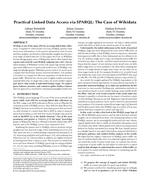Practical Linked Data Access via SPARQL: The Case of Wikidata
From International Center for Computational Logic
Practical Linked Data Access via SPARQL: The Case of Wikidata
Adrian BielefeldtAdrian Bielefeldt, Julius GonsiorJulius Gonsior, Markus KrötzschMarkus Krötzsch
Adrian Bielefeldt, Julius Gonsior, Markus Krötzsch
Practical Linked Data Access via SPARQL: The Case of Wikidata
In Tim Berners-Lee, Sarven Capadisli, Stefan Dietze, Aidan Hogan, Krzysztof Janowicz, Jens Lehmann, eds., Proceedings of the WWW2018 Workshop on Linked Data on the Web (LDOW-18), volume 2073 of CEUR Workshop Proceedings, 2018. CEUR-WS.org
Practical Linked Data Access via SPARQL: The Case of Wikidata
In Tim Berners-Lee, Sarven Capadisli, Stefan Dietze, Aidan Hogan, Krzysztof Janowicz, Jens Lehmann, eds., Proceedings of the WWW2018 Workshop on Linked Data on the Web (LDOW-18), volume 2073 of CEUR Workshop Proceedings, 2018. CEUR-WS.org
- KurzfassungAbstract
SPARQL is one of the main APIs for accessing linked data collections. Compared to other modes of access, SPARQL queries carry much more information on the precise information need of users, and their analysis can therefore yield valuable insights into the practical usage of linked data sets. In this paper, we focus on Wikidata, the knowledge-graph sister of Wikipedia, which offers linked data exports and a heavily used SPARQL endpoint since 2015. Our detailed analysis of Wikidata's server-side query logs reveals several important differences to previously studied uses of SPARQL over large knowledge graphs. Wikidata queries tend to be much more complex and varied than queries observed elsewhere. Our analysis is founded on a simple but effective separation of robotic from organic traffic. Whereas the robotic part is highly volatile and seems unpredictable even on larger time scales, the much smaller organic part shows clear trends in individual human usage. We analyse query features, structure, and content to gather further evidence that our approach is essential for obtaining meaningful results here. - Bemerkung: Note: The data used in this publication is available in the form of anonymised Wikidata SPARQL query logs. There are some discrepancies in the counts since the workshop paper also took queries into account that were not answered in a regular fashion, whereas the published logs restrict to HTTP status 200 (success) responses. The analysis does not change in its main findings due to this.
- Projekt:Project: Cfaed, DIAMOND, HAEC B08, Wikidata
- Forschungsgruppe:Research Group: Wissensbasierte SystemeKnowledge-Based Systems
@inproceedings{BGK2018,
author = {Adrian Bielefeldt and Julius Gonsior and Markus Kr{\"{o}}tzsch},
title = {Practical Linked Data Access via {SPARQL:} The Case of Wikidata},
editor = {Tim Berners-Lee and Sarven Capadisli and Stefan Dietze and Aidan
Hogan and Krzysztof Janowicz and Jens Lehmann},
booktitle = {Proceedings of the {WWW2018} Workshop on Linked Data on the Web
(LDOW-18)},
series = {CEUR Workshop Proceedings},
volume = {2073},
publisher = {CEUR-WS.org},
year = {2018}
}

